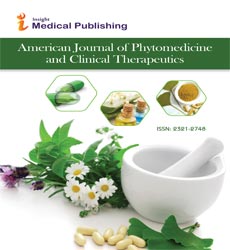ISSN : 2321-2748
American Journal of Phytomedicine and Clinical Therapeutics
Recombinant Pharmaceutical Proteins Generated from Plants
Keyhan Mohammadi*
Department of Food Science, University of Massachusetts Amherst, Amherst, USA
- *Corresponding Author:
- Keyhan Mohammadi
Department of Food Science,
University of Massachusetts Amherst, Amherst,
USA,
E-mail: KeyhanM@hotmail.com
Received date: November 09, 2023, Manuscript No. IPAPCT-24-18556; Editor assigned date: November 12, 2023, PreQC No. IPAPCT-24-18556 (PQ); Reviewed date: November 26, 2023, QC No. IPAPCT-24-18556; Revised date: December 02, 2023, Manuscript No. IPAPCT-24-18556 (R); Published date: December 09, 2023, DOI: 10.36648/2321-2748.11.5.265
Citation: Mohammadi K (2023) Recombinant Pharmaceutical Proteins Generated from Plants. Am J Phytomed Clin Ther Vol.11 No.5: 265.
Introduction
In recent decades, the field of biotechnology has revolutionized the production of pharmaceutical proteins. Traditionally, the manufacturing of therapeutic proteins involved complex processes within microbial or mammalian cell cultures. However, the emergence of plant biotechnology has provided an innovative and efficient alternative for the production of recombinant pharmaceutical proteins. Plants offer a promising platform for the generation of such proteins due to their cost-effectiveness, scalability, and potential for large-scale production. This article delves into the advancements, advantages, challenges, and future prospects of utilizing plants to produce recombinant pharmaceutical proteins. Plant biotechnology offers a versatile and efficient means to produce recombinant pharmaceutical proteins by harnessing the biological machinery of plants to express and synthesize complex therapeutic molecules. This novel approach involves the genetic modification of plant cells to introduce specific genes encoding desired proteins, thereby turning plants into living bioreactors capable of producing valuable pharmaceutical compounds. Advancements in genetic engineering have paved the way for precise manipulation of plant genomes, enabling the expression of a wide array of therapeutic proteins within various plant tissues.
Plant Biotechnology
Genetic modification of plants involves the introduction of foreign genes encoding desired proteins into the plant's genome. This process allows plants to produce pharmaceutical proteins in various tissues, including leaves, seeds, or roots. Transgenic plants have been engineered to express proteins such as monoclonal antibodies, vaccines, hormones, and enzymes, demonstrating the versatility of this technology. Scientists have developed enhanced gene expression platforms and regulatory elements that promote higher yields of recombinant proteins. Utilizing strong and specific promoters, along with signal peptides for proper protein targeting, has contributed to increased expression levels within plant cells. Proper glycosylation is crucial for the functionality and efficacy of many therapeutic proteins. Research efforts have focused on engineering plant systems to replicate human-like glycosylation patterns, ensuring the produced proteins exhibit the correct structure and biological activity. Beyond traditional crop plants, researchers are exploring the use of non-food plants or specific plant varieties that offer advantages for recombinant protein production. Algae, mosses, and other non-traditional plant species are being investigated as potential hosts for expressing pharmaceutical proteins due to their unique cellular characteristics and ease of cultivation. These technologies offer new possibilities for enhancing protein expression, glycosylation, and overall productivity in plant-based systems. Efforts to scale up production and optimize bioprocessing techniques are ongoing. Innovations in downstream processing, purification methods, and bioreactor designs are aimed at improving efficiency and reducing production costs.
Plant-Based Product
Cultivating plants for protein production offers a more costeffective approach compared to conventional systems involving microbial or mammalian cell cultures. Plants provide a scalable platform, allowing for the production of pharmaceutical proteins on a large scale within contained greenhouse or field settings Plant-based systems can minimize the risk of contamination with human pathogens and offer simpler regulatory pathways for approval compared to other production methods. Despite the numerous advantages, challenges persist in the field of plantbased pharmaceutical protein production. Issues such as low protein yields, purification complexities, and concerns regarding protein glycosylation patterns need to be addressed. Research efforts are ongoing to enhance protein expression levels, optimize purification processes, and ensure correct protein modifications within plant systems. Plant biotechnology offers a versatile and efficient means to produce recombinant pharmaceutical proteins by harnessing the biological machinery of plants to express and synthesize complex therapeutic molecules. Advancements in genetic engineering have paved the way for precise manipulation of plant genomes, enabling the expression of a wide array of therapeutic proteins within various plant tissues. Plants such as tobacco, maize, soybeans, and even mosses have been genetically engineered to synthesize proteins ranging from antibodies and vaccines to hormones and enzymes.

Open Access Journals
- Aquaculture & Veterinary Science
- Chemistry & Chemical Sciences
- Clinical Sciences
- Engineering
- General Science
- Genetics & Molecular Biology
- Health Care & Nursing
- Immunology & Microbiology
- Materials Science
- Mathematics & Physics
- Medical Sciences
- Neurology & Psychiatry
- Oncology & Cancer Science
- Pharmaceutical Sciences
